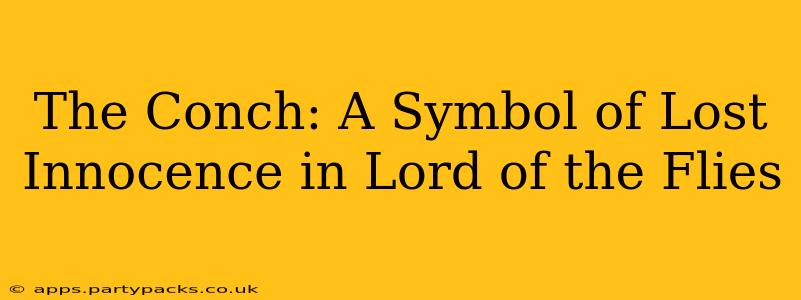William Golding's Lord of the Flies is a chilling exploration of human nature, revealing the fragility of civilization and the inherent savagery lurking beneath the surface. Central to this exploration is the conch shell, a powerful symbol that undergoes a dramatic transformation throughout the novel, mirroring the boys' descent into savagery and the loss of their innocence. This essay will delve into the multifaceted symbolism of the conch, analyzing its significance as a representation of order, civilization, and ultimately, the lost innocence of the stranded boys.
What Does the Conch Symbolize in Lord of the Flies?
The conch initially represents order and civilization. Found by Ralph on the beach, it immediately becomes the instrument of establishing a democratic society. The sound of the conch summons the boys, its blowing signifying the start of meetings and the authority to speak. Holding the conch grants the speaker the floor, representing a structured, civilized way of resolving conflicts and making decisions. This is a direct contrast to the chaotic and primal instincts that begin to emerge later in the novel.
How Does the Conch Represent Civilization?
The conch's power lies not in its inherent properties but in the boys' collective agreement to accept its authority. It's a symbol of their shared commitment to reason, democracy, and the rules of society they have consciously created. As long as the conch is respected, the boys strive to maintain a semblance of order and civility, albeit a fragile one. The rules and procedures surrounding the conch—only the conch holder can speak—demonstrate an attempt to create a microcosm of civilized society on the island.
What Happens to the Conch and Why Is It Significant?
The destruction of the conch marks a pivotal moment in the novel, signifying the complete collapse of order and the triumph of savagery. Piggy's death, accompanied by the shattering of the conch, underscores the irreversible loss of innocence and reason. The act is violent and deliberate, highlighting the boys' descent into primal instincts and the rejection of all that the conch represented. It’s a symbolic annihilation of hope and the potential for a return to civilization.
How Does the Conch Symbolize the Loss of Innocence?
The conch's journey mirrors the boys' loss of innocence. Initially, it represents the hope of rescue and the preservation of civilized behavior. As the boys succumb to fear, hunger, and their own inherent savagery, the conch’s authority weakens. Its eventual destruction symbolizes the complete loss of innocence, the abandonment of reason, and the irreversible embrace of primal instincts. The boys’ inability to maintain the conch’s authority reflects their inability to hold onto their childhood innocence in the face of the island's brutal reality.
Is the Conch a Symbol of Hope?
While the conch primarily symbolizes the loss of innocence, it can also be viewed as a fading symbol of hope. Its existence serves as a constant reminder of the potential for rescue and a return to civilization. The boys' attempts to maintain order through the conch show their lingering desire for rescue and a return to their former lives. Even as the conch's authority diminishes, this flicker of hope remains until its ultimate destruction.
What is the Significance of the Conch's Destruction?
The shattering of the conch is not merely a physical act but a symbolic one. It represents the complete and utter destruction of the boys' hopes for rescue and their descent into unrestrained savagery. The once-powerful symbol of order and reason is reduced to rubble, mirroring the collapse of their fragile society. The destruction of the conch underlines the horrifying truth of the novel: the inherent darkness and savagery within human nature can easily overcome even the most idealistic attempts at civilization.
In conclusion, the conch in Lord of the Flies serves as a multifaceted symbol, embodying order, civilization, and ultimately, the tragic loss of innocence. Its journey from a symbol of hope and reason to a shattered remnant reflects the boys' descent into savagery and the overwhelming power of primal instincts. The conch's destruction signifies the irreversible loss of childhood innocence and the terrifying consequences of abandoning reason and civilized behavior.

